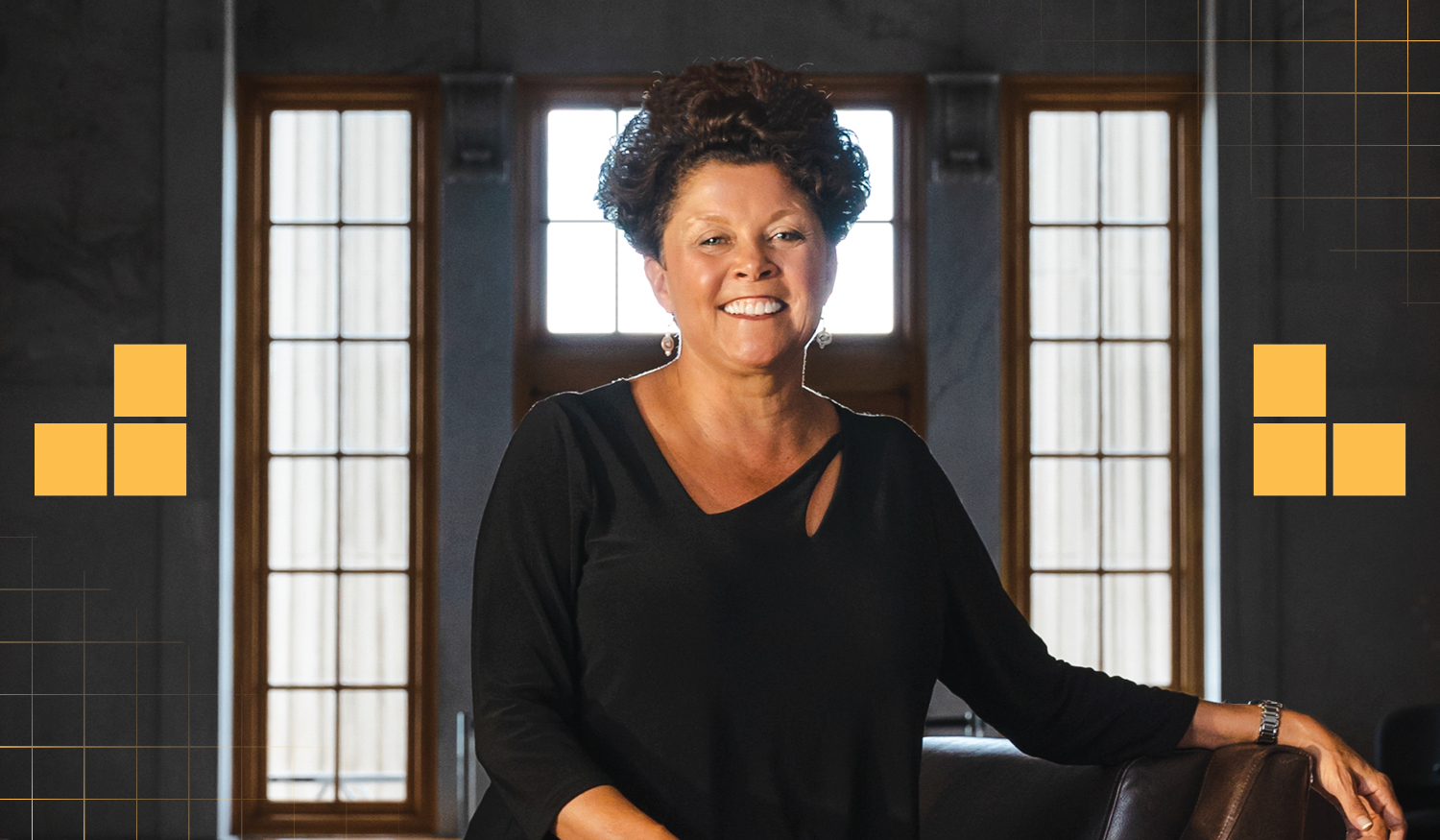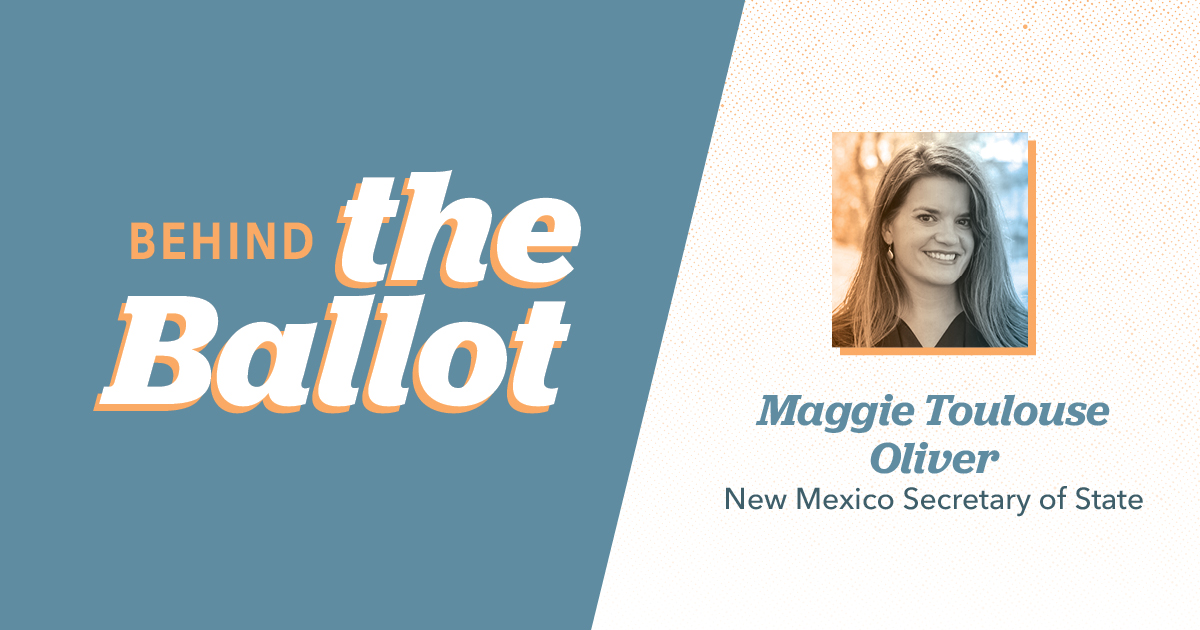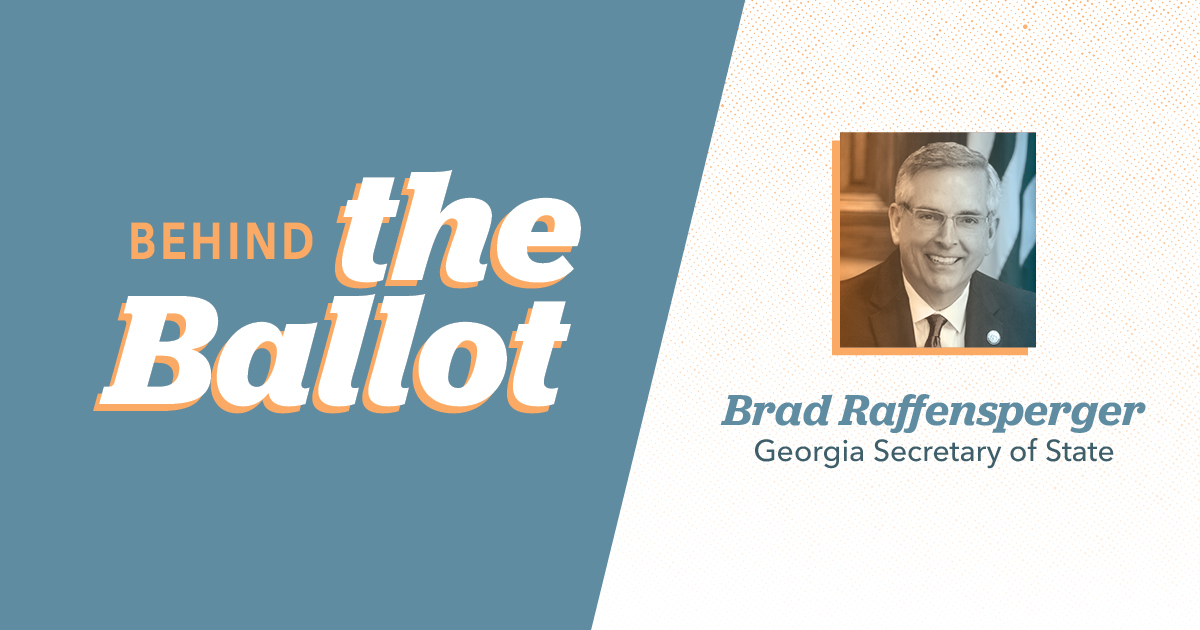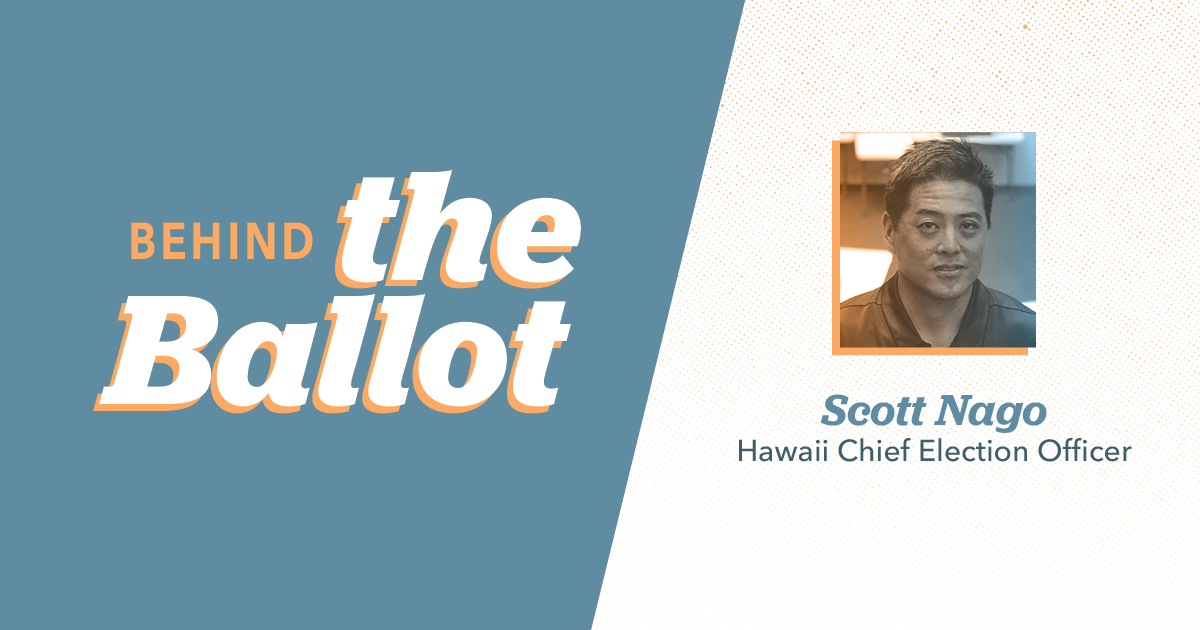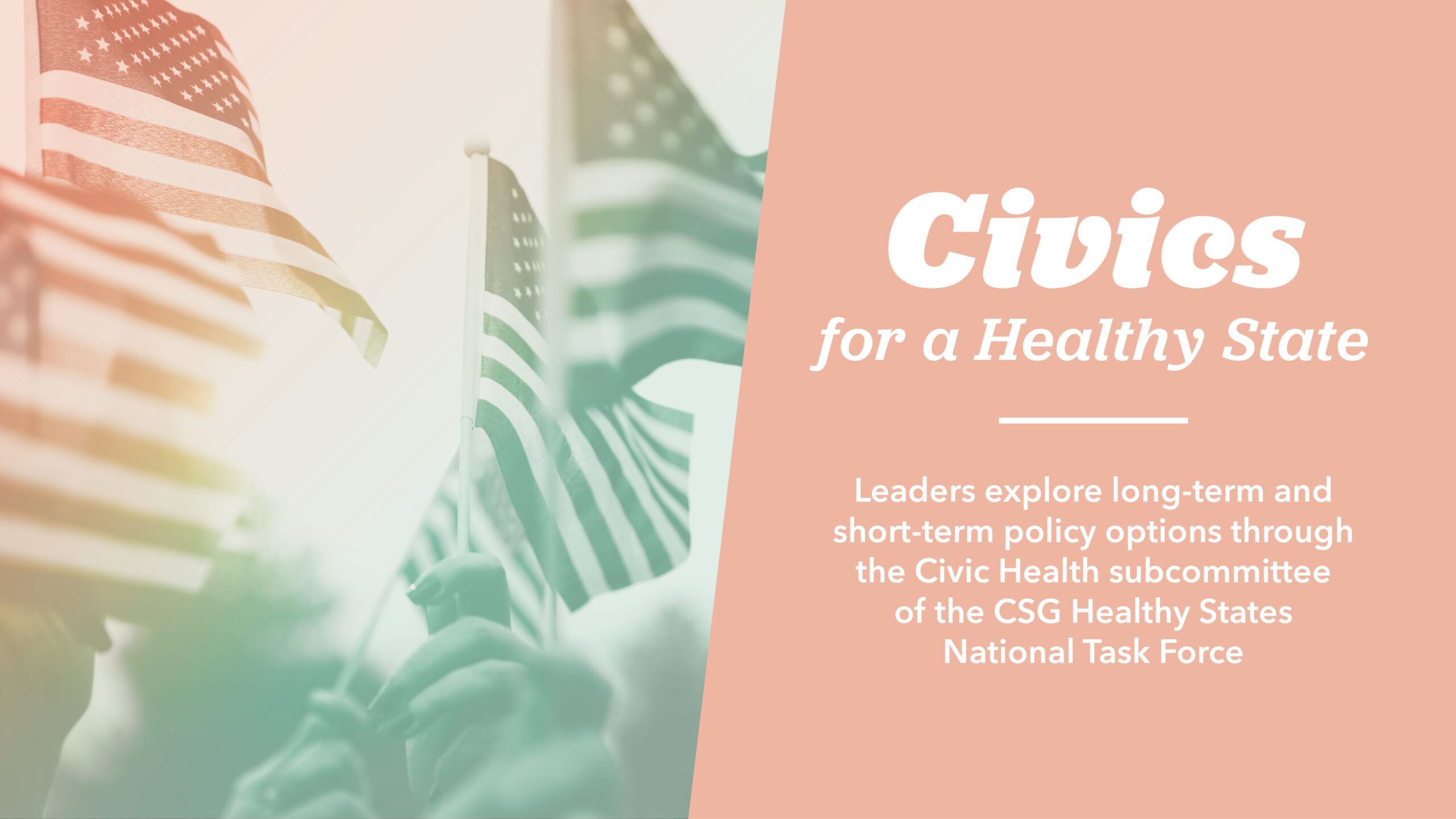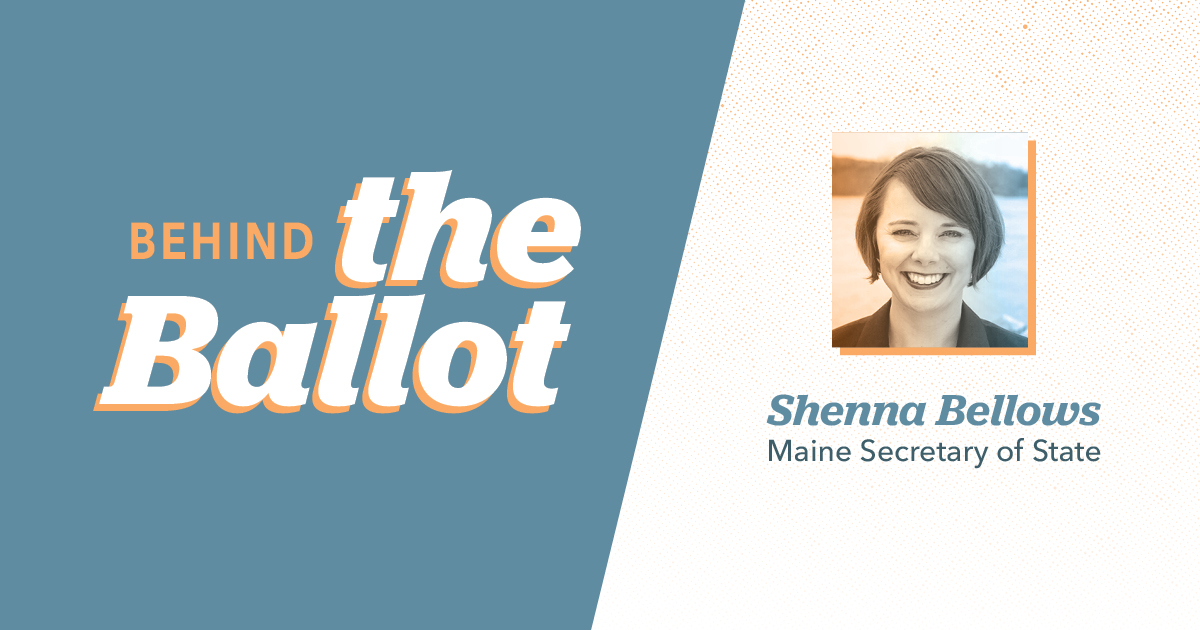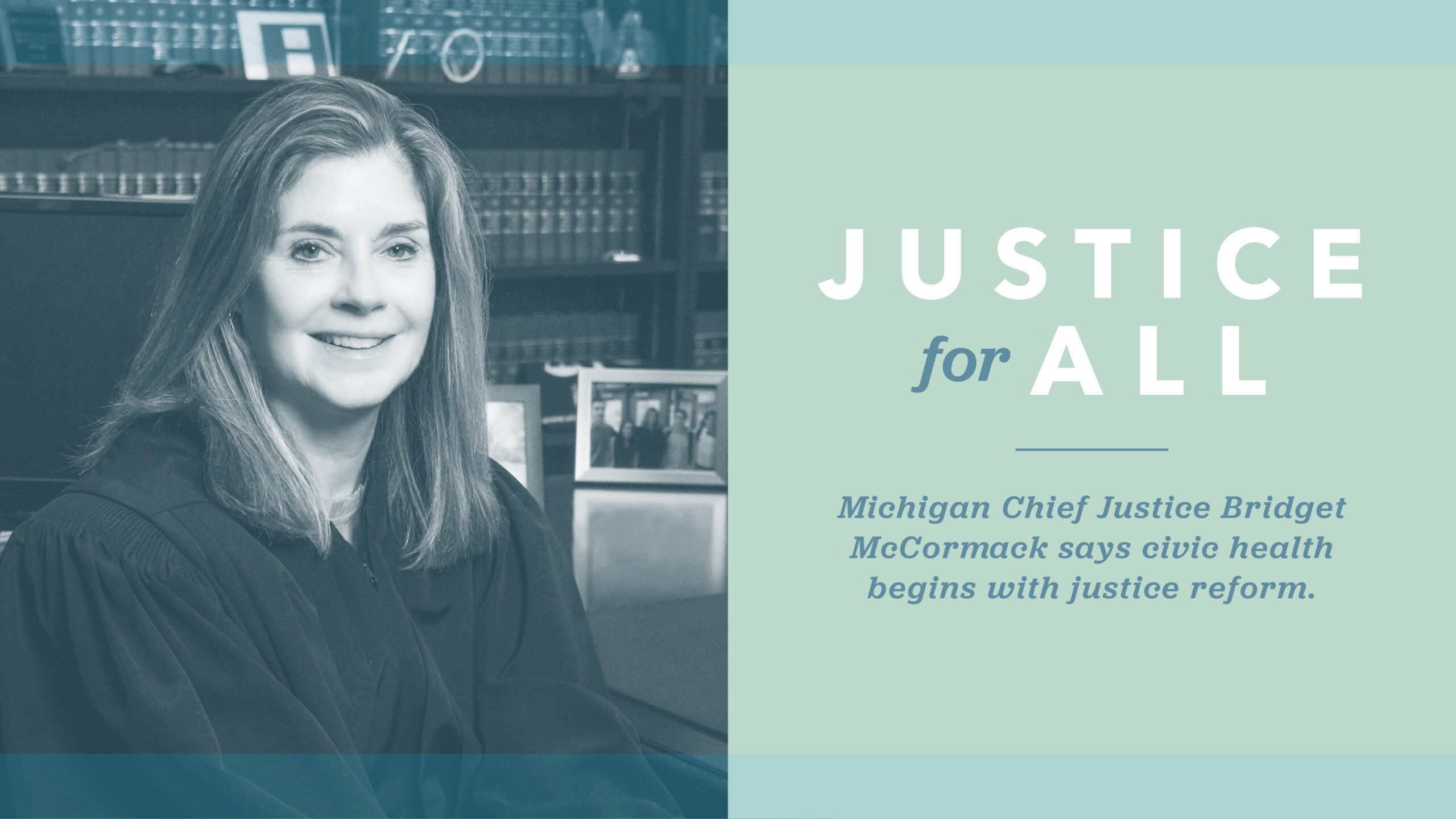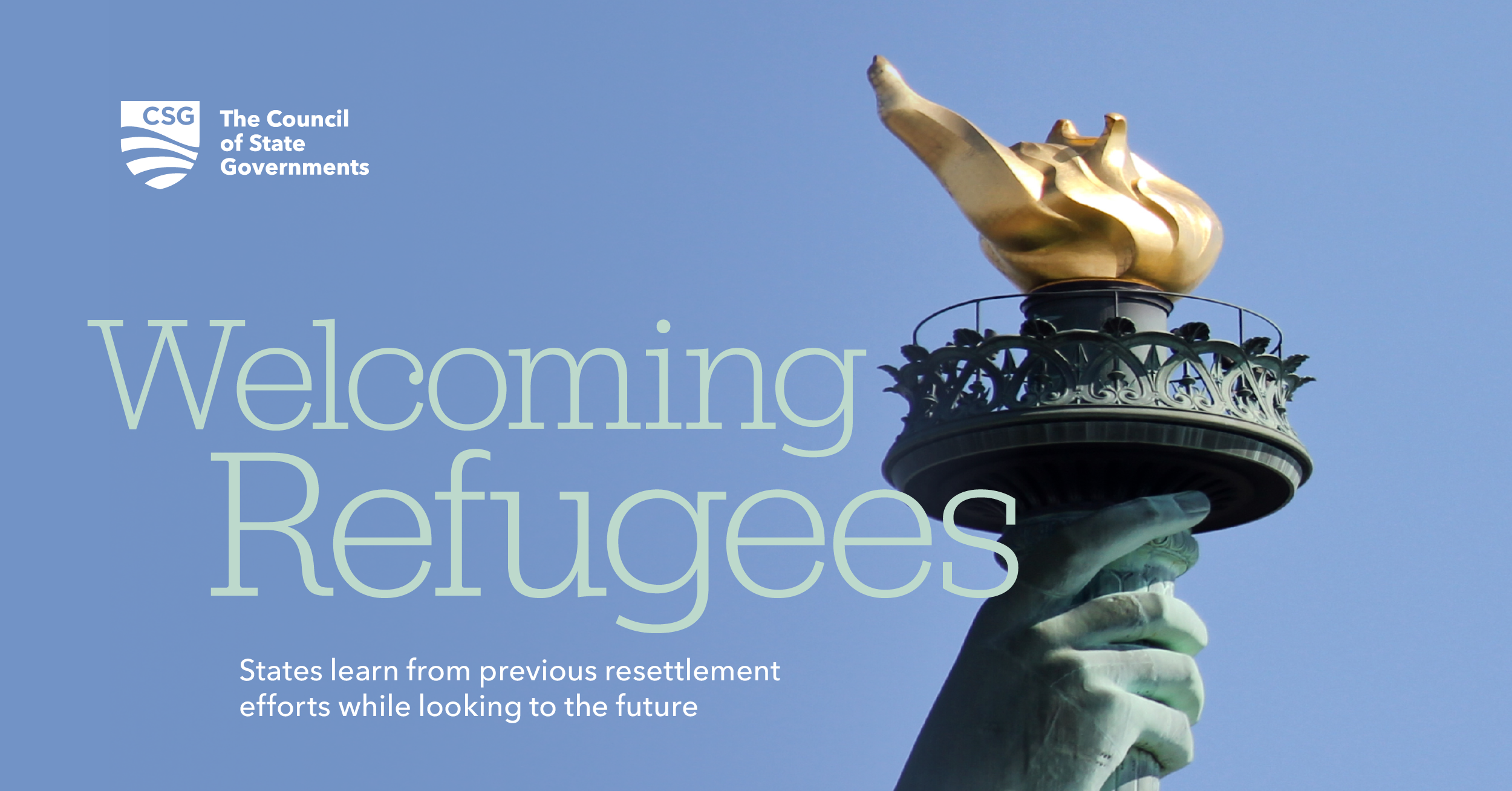Tennessee Commissioner of Mental Health and Substance Abuse Services Marie Williams chairs the CSG Justice Center Advisory Board.
Continue readingBehind the Ballot Sec. Toulouse-Oliver
Behind the Ballot with Sec. Raffensperger
Brad Raffensperger – Georgia’s Secretary of State
Brad Raffensperger may have a high profile in the national media, but the Georgia secretary of state’s focus is the same as when he took office in 2018 — keeping elections secure, accessible and fair in his home state.
He couldn’t have anticipated when he started this job how quickly challenges would come, both from the right and the left.
“When I ran in 2018, I didn’t realize that, as soon as I took office, I’d have nine lawsuits from the losing gubernatorial candidate and her allies,” Raffesnperger said. “We’ve been pushing back on false election claims, really, since January of 2019.”
When he ran, Raffensperger says the issues were straightforward — Georgia was still using outdated direct recording electronic voting machines. His campaign message was based on security: the state needed to move to new voting machines with a verifiable paper ballot, and Raffesnperger wanted the authority to join the electronic registration information center, known as ERIC, a collaborative tool that allows states to objectively and accurately update voter rolls.
As it turned out, however, Raffesnperger encountered an elections climate that was far from ordinary.
“We didn’t expect it — I don’t think anyone could have expected it, really — looking at the scrutiny that [secretaries of state] have gone through since the recent elections,” he said.
Raffensperger says tensions around elections aren’t new. In Georgia, the problem goes back at least to 2014, and he lays blame to activist groups like the New Georgia Project, and to those who refused to accept the results of the 2016 election, as well. In 2020, Raffensperger didn’t hesitate to call out his own side of the aisle when former President Donald Trump made unfounded claims about fraud in the 2020 election.
“The challenge the President had is that we looked up and down the line to make sure that we checked out every single allegation,” Raffensperger said. “By the time we had that call with the President, we knew that the numbers were the numbers. And it was just trying to respectfully and as calmly, you know, let the President know that. ‘These are what the numbers are, sir.’”
False claims about elections — from the right or the left — are distractions. The important thing, Raffesnperger says, are that elections in Georgia are more secure and more accessible than ever before. The state has photo ID for all forms of voting, automatic voter registration and citizenship checks through the Department of Driver Services, and 17 days of mandatory early voting. Raffensperger says registration rates shot up, and today the state has more than 7.5 million voters.
“It just shows you that it’s easier to vote in Georgia, but we’ve struck that proper balance. Georgia is really doing a great job and we’re going to focus in on that.”
Raffensperger says trust and consensus building are two of the ways state leaders and everyday citizens can move away from election conflict and begin restoring trust in democratic institutions.
“Someone said that Eisenhower was a very effective president because he looked at where he could get 60-80% of people agreeing on an issue, and then he focused on that,” Raffensperger said. “He didn’t worry about the stuff where he knew he was going to get 20-40% or even 55%.”
Raffesnperger believes that change really begins on the individual level, though. Rather than focusing on policies, he says focusing on principles and character will create pathways back from the precipice. That, and a little bit of good will.
“Luke Bryan said it best — most people are good,” Raffensperger said. “So never lose sight of that: that most Americans are good people.”
Behind the Ballot with Scott Nago
Civics 101
State leaders share perspectives on civic education for a healthy democracy.
Continue readingEquitable Access
States use innovative strategies to ensure voting access for voters with disabilities and military and overseas voters.
Continue readingCivics for a Healthy State
By Carl Sims
The CSG Civic Health Subcommittee of the Healthy States National Task Force is exploring how states can improve civic discourse and participation through immediate-term actions by state leaders and long-term investments in civic education.
The subcommittee is part of a larger initiative — the 2021-22 CSG Healthy States National Task Force. A bipartisan working group of state leaders from all three branches of government, the task force is working to provide resources and recommendations for state governments on how to best address current state challenges, including those resulting from and intensified by the COVID-19 pandemic.
Supported by CSG staff and other subject matter experts, the task force focuses on four key policy areas to provide states a holistic policy strategy for their shared challenges. In addition to civic health, the national task force is exploring infrastructures related to fiscal health, workforce and economic health and human health. Click here to learn more about the 2021-22 CSG Healthy States National Task Force.
Tennessee state Sen. Bo Watson and Delaware state Sen. Bryan Townsend, who co-chair the national task force, say civic health represents a basic building block of a free society. Without a minimum understanding of how government works, or their role in it, citizens will not be able to fulfill their obligations to each other — or to the future.
“A fundamental tenet of our democratic republic is that an educated citizenry is a vital requisite for our survival as a free people; therefore, to be civically healthy it is imperative that our citizens understand how our system of government operates so they can best engage and hold accountable the government they elect,” Watson said.
For Townsend, civic health is built on the faith citizens have in one another and in their institutions of government. Consequently, he says it’s vitally important that people — elected leaders and citizens alike —learn ways to disagree without becoming “toxically disagreeable.”
“Civic health is the measure of how well we have adopted such an approach, building the necessary systems and culture of using them,” he said. “Without it, our disagreements will consume us and the potential of America.”
Considerations for Leaders
The Civic Health subcommittee addresses foundational questions around building healthy and resilient democratic institutions and advancing civic education. Maine Secretary of State Shenna Bellows, who co-chairs the subcommittee with Ohio Secretary of State Frank LaRose, says she is most excited by the subcommittee’s meaningful and civil engagement across party lines.
“The committee itself is comprised of elected officials with diverse roles representing both major political parties, and the diversity of political background and experience has deepened the conversations about what the health of our civic institutions can look like if we truly engage with one another,” she said. “It’s been fascinating to find that sometimes we agree on principles but not on word choices. Breaking through that initial resistance to try to find shared understanding is really important. We’re in a dangerous moment for our democracy, and finding a path forward is going to require dialogue, especially when it’s difficult.”
Subcommittee members have suggested that leaders can improve public trust in government institutions and improve civic discourse by utilizing the capacity and profile of their office. In particular, state leaders may consider the following:
• Proactively combatting misinformation and disinformation as it is occurring. Additionally, and to help in that effort, state leaders should have strong social media presences and post regularly, even outside of major events like elections, to build legitimacy and maintain a steady stream of reliable civic information.
• Working on one’s emotional intelligence to make bipartisan solutions more possible.
• Recognizing how humans respond organically to context, structure and signals and require a feeling of safety for difficult conversations.
• Creating discourse among differing groups by establishing values and a vision. Ask participants: “What do we want to be true of the place where we live?”
Subcommittee members say these actions can be complemented by long-term investments in K-12 civic education. Evidence suggests a connection between civic education and civic engagement. According to a 2011 report titled, “Guardian of Democracy: The Civic Mission of Schools,” students who receive high-quality education are more likely to “understand public issues, view political engagement as a means of addressing communal challenges, and participate in civic activities.”
Current challenges to a robust civic education framework include the following:
• A 2020 poll from the Annenberg Constitution Day Civics Survey found that only 51% of Americans polled could name all three branches of government.
• The federal government invests five cents per student for civics, but $54 per student for STEM.
• Student performance on the National Assessment of Educational Progress in Civics is stagnant, with civic knowledge and skills spread inequitably by race/ethnicity.
States can also consider how civic education must celebrate the country’s accomplishments while acknowledging the country’s difficult history and its difficult present. Improvements to a civic education framework may include greater funding for civic education, strengthening course requirements and assessments, reforming education standards and curriculum and enhancing accountability.
Civic health presents a number of areas where state leaders can come together to collaborate to build civic engagement. For Bellows, one of the most promising areas is election access and voting rights.
“I think it’s important that we continue to find ways to get back to a place where strengthening and protecting voting rights for all American citizens is a shared goal for all state leaders,” she said. “Civic health ultimately depends upon a healthy democracy where every citizen has equal access to exercise their constitutional rights to register to vote, cast their ballot and have their vote to be counted. Regardless of who we are or where we come from, everything else we care about depends upon that.”
Townsend and Watson both identify the unique opportunity — and responsibility — states have in advancing civic health.
“A principle of a democratic republican form of government is that the government that governs closest to the people, governs best; therefore, the states, in our federal system of government, have the primary duty and responsibility of providing civic education to their citizens since it is the states that have the most intimate relationship with their citizens,” Watson said. “In order for states to fully exercise the power afforded to them in the U.S. Constitution and to hold the federal government accountable, it is essential that states educate their citizens on how our government is structured, how it operates, how to engage it and how to hold it accountable.”
Townsend noted that, even though national government has become dominant in the federalist system, state governments must take the lead in advancing civic health.
“As our federalist system experiences tension from this preemption, the states still remain uniquely positioned to provide a renaissance in civic health by movingly nimbly to respond to individual state-level issues and evidencing to the electorate the ability of government to respond to the people. Such is the system design; we desperately need the states to fulfill this role.”
Learn more about the Civic Health subcommittee and explore resources at: web.csg.org/csghealthystates/civic-health.
Behind the Ballot with Sec. Bellows
Shenna Bellows – Maine’s Secretary of State
Shenna Bellows has served as the executive director to the Holocaust and Human Rights Center as well as the American Civil Liberties Union of Maine. She was a Maine senator for four years before being selected by the Maine Legislature to serve as secretary of state. Throughout her career, and specifically in her role as secretary, Bellows has led with the philosophy of “radical transparency,” and this election season is no different.
Bellows says that she and her staff are fighting against the brewing distrust of the voting process and widespread misinformation with open communication to the people of Maine.
“Everything that we do, we share,” she said. “We have published voter information guides, we work with our local election officials to help conduct radio interviews to talk through election processes, not just once in election season, but in an ongoing basis. We have relationships with our radio hosts, with our television broadcasters and the local media so that they understand how our elections are administered.”
Partisan pushbacks are an area of concern across the nation. However, Maine’s deliberate bipartisan efforts have been extremely helpful in building back voter confidence. The state has codified law that requires an equal representation of Democrats and Republicans at the polls, information Bellows has used to ease the minds of voters and even recruit volunteers. This upcoming election season, state leaders are grappling with a drop in local election clerks, in-part due to the rise in animosity toward elections. Maine’s elections are run through municipalities, as opposed to being county-based and rely on over 500 election officials to administer state, local and federal elections.
“One of the trends that we’re seeing that’s happening across the country is the retirement and turnover among local election officials. That’s precipitated in part because of a rise in threats against election workers and people being more extreme or angry when they’re interacting with their local election officials, which has made the job more challenging,” Bellows said.
However, new bi-partisan legislation has put in place protections for poll workers in addition to bolstering the security and efficiency of elections.
“We’ve been successful in our state legislature. The legislation to protect election workers was bipartisan and we were also able to work collaboratively in the legislature to secure additional resources for training and post-election audits to help strengthen public trust and the accuracy and security of our elections. So, we’ve been really pleased to see that.”
Maine was one of the first states to introduce and adopt ranked choice voting with overwhelming support from voters. For Bellows, it was important to make this new voting process visible for all Mainers, which she says helped boost voter trust.
“Like any other aspect of elections, what’s most important is to be fully transparent about how it works,” she said. “Live streaming the ranked choice voting tabulation, for example, helps people understand how that works. Making sure that we test some of our materials like ballot design and voting for people with disabilities with representatives from the disabilities community before we launch has increased voter confidence as well.”
Beyond the ballot, Secretary Bellows is optimistic for a future of positive change. To achieve that future, she’s relying on her ideals of valiant honesty and fairness through cross-party collaboration.
“We can only achieve permanent and lasting positive change if we work together and bipartisan coalitions to get things done. Our country depends on a process. That entails checks and balances and the free and fair debate of ideas.
“The principle of no permanent friends and no permit enemies is one that I brought with me into elected office, because I think it’s really important to look past where we come from or our political affiliation to try to reach common ground around shared values.”
Justice for All
Michigan Chief Justice Bridget McCormack says civic health starts with justice reform.
Continue readingWelcoming Refugees
States learn from previous resettlement efforts while looking to the future.
Continue reading


